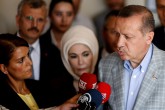As we pass through historic days that mark the first popular presidential election in Turkey’s political history, debates are rife concerning potential changes it may trigger in the parliamentary system and macroeconomic governance paradigm. Given Turkey’s current electoral dynamics, a landslide by Prime Minister Recep Tayyip Erdoğan in the first round seems like a foregone conclusion, an outcome already determined by international financial markets. Moreover, despite counter-claims by Erdoğan’s domestic and international adversaries, the leadership transition within the Justice and Development Party (AK Party) is likely to proceed smoothly in the absence of serious political in-fighting or economic destabilization. Yet, the new political configuration in which Erdoğan will undertake the role of a proactive president along with a new prime minister and government is bound to have serious repercussions for macroeconomic governance. Given Turkey’s apparent need to change track in its existing economic development narrative, this development might not be so bad after all.
Leading successive AK Party governments, Erdoğan oversaw uninterrupted economic growth and vast improvements in social standards that established Turkey as one of the major emerging markets over the course of the last decade. GDP growth from $230 billion to $820 billion and growth of per capita income from $2,500 to over $10,000 were achieved along with great strides in infrastructure, institutional reforms and social programs aimed at poverty alleviation. Admittedly, much of Turkey’s successive development drive was carried through within a favorable international conjuncture characterized by international financial flows to emerging markets. Yet, Turkey managed to decouple from various developing economies by minimizing the negative impact of the global economic crisis after 2008 thanks to its robust governance architecture. At this point, signs of erosion were noticed in the governance capacity of some of Turkey’s leading economic agencies following the political trauma created by the Gezi protests and the Dec. 17 process. The Central Bank of Turkey in particular was placed under the spotlight following a chain of hasty and controversial decisions that triggered an excessive hike in interest rates in January that have not been withdrawn, thereby fuelling higher inflation and harming the investment climate.
As the end of the low interest policy in the U.S. looms and the expected return of international funds to mature markets comes nearer, it might be the perfect moment for Turkey to modify its economic governance paradigm. In the aftermath of the presidential elections, a comprehensive set of second-generation reforms have to be initiated to restore economic growth in a low inflation environment. These include reforms in the labor market, technical and higher education, technology and research & development policies, as well as fiscal and judicial regimes to rejuvenate the investment climate and facilitate the inflow of foreign direct investments. A stronger executive branch under an Erdoğan presidency might effectively push forward these reforms and easily galvanize a new macroeconomic governance paradigm.
The new paradigm should prioritize improvements in national savings and productivity increases in advanced manufacturing sectors via comprehensive investments in elite human potential, new forms of infrastructure and technological capacity. In addition to macroeconomic stability, it should involve “smart economic planning” aimed at global competition in specific strategic sectors. To this end, a major overhaul of the economic governance architecture will be required, and changing the remit of the central bank to include economic growth and employment – alongside price stability – might turn it into a pivotal institution. Critical historical epochs require critical decisions, and Turkey’s political leadership has the capacity to make them.
[Daily Sabah, 09 August 2014]
In this article
- Domestic Policy
- Opinion
- 2008
- 2014
- Daily Sabah
- Economy
- Elections
- Inflation
- Istanbul
- May 28-August 20 2013 The Gezi Park Protests
- Presidential Election
- Prime Minister
- Recep Tayyip Erdoğan
- taksim
- The President of the Republic of Türkiye
- Turkish President
- Türkiye's Justice and Development Party | AK Party (AK Parti)
- United States (US)


